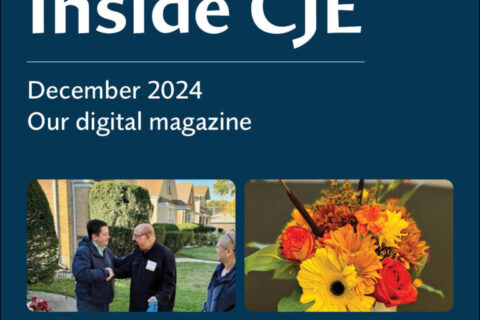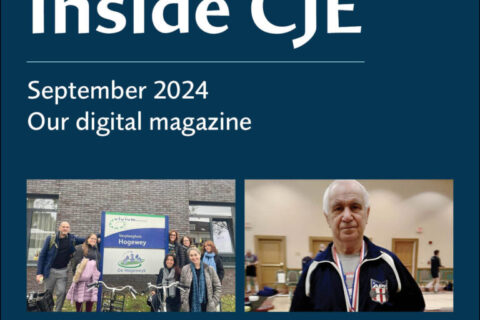Inside CJE May 2025
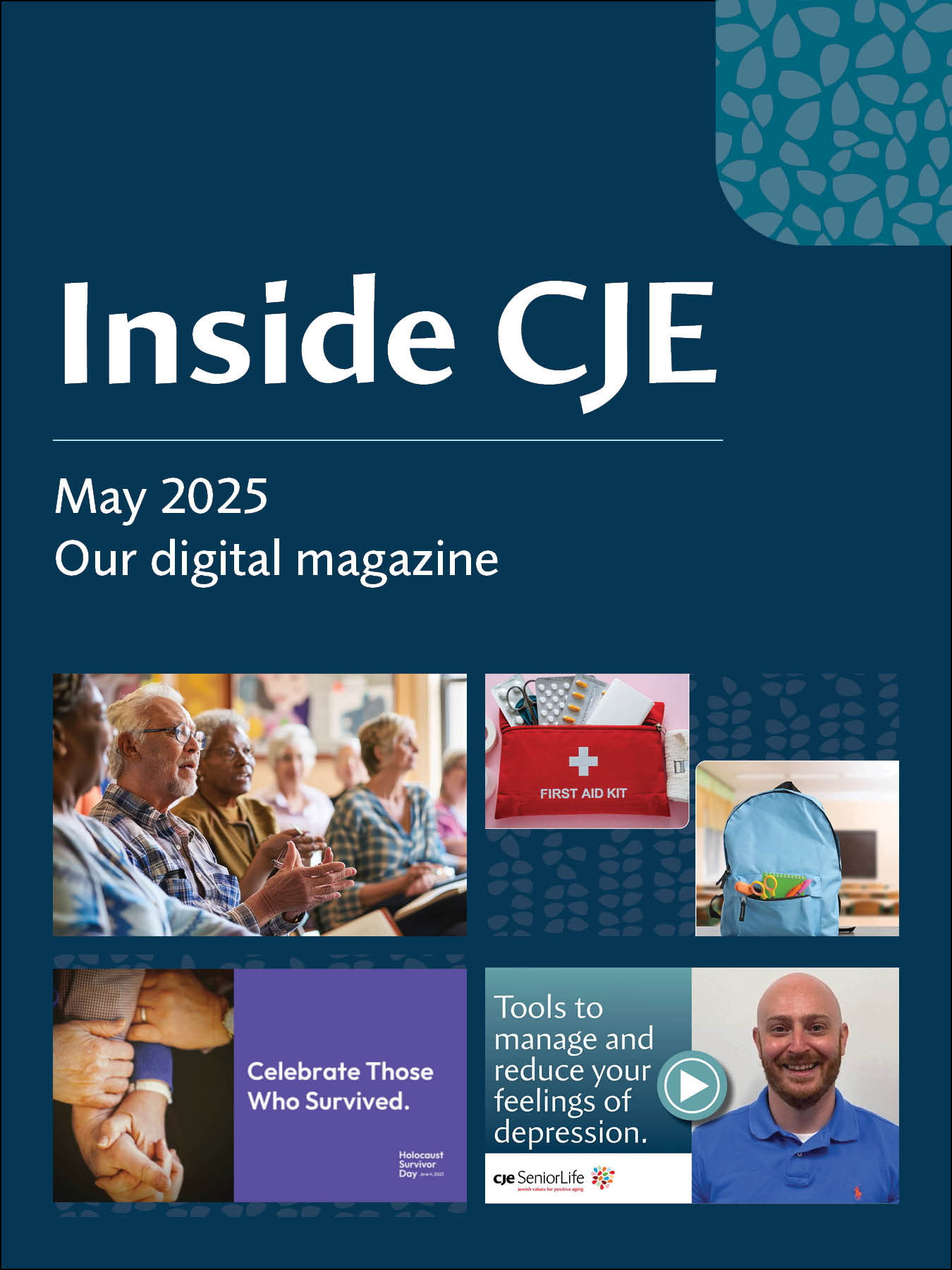
We are thrilled to present Inside CJE! Our digital digest is packed with exciting news about CJE SeniorLife’s various communities, programs, and services—and delivered straight to your inbox. Find out what’s happening at CJE!
-
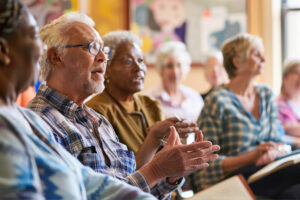 Recently, a woman who was noticing cognitive changes in herself arrived at CJE SeniorLife (CJE) to participate in Take CHARGE, a relatively new program for those who are aware they are beginning to experience early memory change.
Recently, a woman who was noticing cognitive changes in herself arrived at CJE SeniorLife (CJE) to participate in Take CHARGE, a relatively new program for those who are aware they are beginning to experience early memory change.“She said, ‘I know my repetitive questions to my husband wears on him,’ said Tori Gruber, Senior Manager, Cognitive Services at CJE. “She wanted to take charge of some of her care and be an active participant in efforts to support her cognitive journey. She also hoped to delay the shift in her relationship with her husband from partners in life to caregiving partners for as long as possible.”
Widely known for its popular Adult Day Services programs in Evanston and Deerfield for those with early- to mid-stage dementia, and for Weinberg Community’s Friend Center for Memory Care, CJE SeniorLife has been expanding into other areas of cognitive care services.
“Our motivation is to build cognitive support in the community to help people age gracefully at every turn,” Gruber said. “Often, people think cognitive change is a dark cloud, that they need to move into a facility, and there’s no alternative. We see the need to fill the gaps in holistic care and to support people in the community.
“Our goal of building out the cognitive campus at Howard Street in Evanston is to be the answer to ‘what’s next?’ for a dementia diagnosis. We have seen gaps in our service provision at Adult Day Services, and we want to broaden our reach to enhance early-stage cognitive change programming, care partner support, and dementia community education while continuing to offer the excellent services we traditionally have provided.”
The timing couldn’t be better. According to the Centers for Disease Control and Prevention, about 1 in 10 adults (45 and older) report worsening memory loss (or cognitive decline), and another 1 in 4 reports caring for someone who has a cognitive impairment. As more than 75 million Baby Boomers, who range from roughly 60 years old to 80 years old, continue to age, those with cognitive decline and those taking care of them grow daily.
The breadth of what is being offered at CJE is eye-opening. Take CHARGE is a six-week program to develop strategies and skills for those experiencing early memory loss to help them navigate their daily lives. Each week for two hours, the group covers an area of positive aging with a subject matter expert who provides guidance, shares and discusses an informational article, and works through a project or activity with participants that focuses on their topic area. At the end of each session, participants create an action plan to implement during the ensuing week. It typically involves cognitive exercises and compensatory strategies that they learned that week.
“With Take CHARGE we wanted to help people find relief through the earlier stages of cognitive change by providing training and skill building
with more purposeful opportunities,” Gruber explained. “But we also found out we’re building a community of support. Participants feel a sense of comfort being around folks with shared experience, and they’ve said they feel they don’t have to fake it anymore.”CJE is also committed to continuing to elevate its Adult Day Services program as part of its growth. Gruber noted the goal is to enhance early-stage cognitive change programming, care partner support, and dementia community education. Today, the program focuses on those who live at home but who may benefit from a place during the day for socialization, structure, and supervised support. Each day’s activities integrate memory support, health and wellness, meals, and creative arts therapies, such as music and dance.
Everything that CJE provides today, along with future programming, wouldn’t be possible without their team of social workers, registered nurses, certified nursing assistants, and community partners. These professionals allow the organization to leverage existing resources and relationships in order to broaden its services.
“Our social workers provide so much support to our family members during their time of emotional upheaval,” Gruber said. “We hope to enhance our care coordination services with our wonderful social work team by providing more clinical and dementia care navigation services.”
CJE SeniorLife also champions caregivers. Launched in 2022 with Elderwerks Educational Services, Dementia Reality is a creative, supportive training program that uses virtual reality headsets to share real-life scenarios. According to an article in Classic Chicago magazine, “the idea is to make caregivers more empathetic to what their clients are enduring, which will improve the quality of their patients’ care.” This program was initially designed for professional caregivers, but as part of the CJE’s cognitive care initiatives it has been adapted to support and train family caregivers as well as to empower and connect caregivers through training.Gruber said primary caregivers often arrive at CJE SeniorLife overwhelmed and worried by the daunting journey ahead. Aside from the Dementia Reality program, CJE has been able to offer other support for caregivers.
“A caregiver the other day said her mom is going back to her native language instead of English, and the daughter does not know the native language,” Gruber said. “The daughter has trouble finding time to take care of herself, let alone navigate and coordinate her mom’s care. We said, ‘Let’s give you more time to take care of yourself by adding more days for Mom at ADS.’ Our ADS social worker compiled a comprehensive resource list for her—care navigation for the next few stages, such as culturally specific adult day programs, assisted living communities, and in-home care agencies that can better support her mom with her current needs.”
“We are nothing without our family caregivers. When they come through our door, we hope we can help them breathe. We say, ‘We’re here to help, we have resources, and ways to support you through this.’”
Overall, CJE SeniorLife team members are excited to implement a new era in cognitive care support. “This vision for more comprehensive cognitive care has reinvigorated the passion in our team,” Gruber said. “Staff are energized by the new opportunities they will have and for all the new people we will be able to support in our community.”
To find out more about CJE’s memory support programs and services, please visit www.cje.net or call 773.508.1000.
-
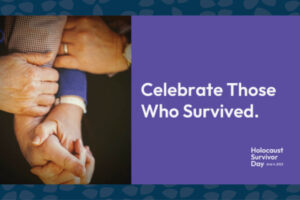
Holocaust Survivor Day created just four years ago at the Jewish Community Center in Krakow, Poland, has taken on international significance. Celebrated on June 4 each year, it honors these brave souls, all of whom were children or young teenagers during the Holocaust. Chicago’s own annual commemoration of this special event will take place on June 5, at Congregation Emanuel. That day, CJE SeniorLife’s Holocaust Community Services (HCS ) will host approximately 200 Survivors and their loved ones, for a true celebration of life. When the guests arrive, they will be treated to a beautiful concert by the Civic Orchestra of Chicago, as well as brunch.
“This [event] is about life,” says Maya Gumirov, CJE Survivor Services Director of Holocaust Community Services. “Those that thank G-d are still with us, their life, their bravery, their resilience, their achievements after the war, how they built lives, learned professions, and started families is what we would like to acknowledge.”
To make sure that Holocaust Survivor Day is a meaningful and well-run event, organizers start to plan months before. HCS, along with a large group of dedicated volunteers from CJE, Maot Chitim of Greater Chicago, JUF Russian Speaking Jewish Division and JUF Tov make sure the needs of the guests of honor are met. For those who cannot arrive on their own or lack someone to bring them, HCS arranges round trip transportation, whether by bus, van, taxi, or private car. Interpreters, mostly for the Russian-speaking Survivors, who today comprise most of the guests, translate for anyone who does not understand English. The oldest Survivors present, those who have reached 100 years of age, receive special recognition.
Today, approximately 220,800 Holocaust Survivors are still living, with a median age of 87. Just 16 percent of those live in the United States. HCS provides services, including financial assistance with food, medications, home care and emergency assistance, reparations assistance, and socialization opportunities, to approximately 1,600 Survivors in the Chicago area. Celebrating them and their courage is so important. It teaches and inspires everyone who participates and supports this event. HCS continues to maintain a strong connection with JCC Krakow and exchange ideas on how they have celebrated this special occasion.
Holocaust Survivor Day is free for Survivors and their guests, generously funded by the Conference on Jewish Material Claims Against Germany, and KAVOD Survivors of the Holocaust Emergency Fund (SHEF). For more information about Holocaust Community Services, please visit https://cje.net/supportiveservices/holocaustcommunityservices/ or call 773.508.1000.
-


